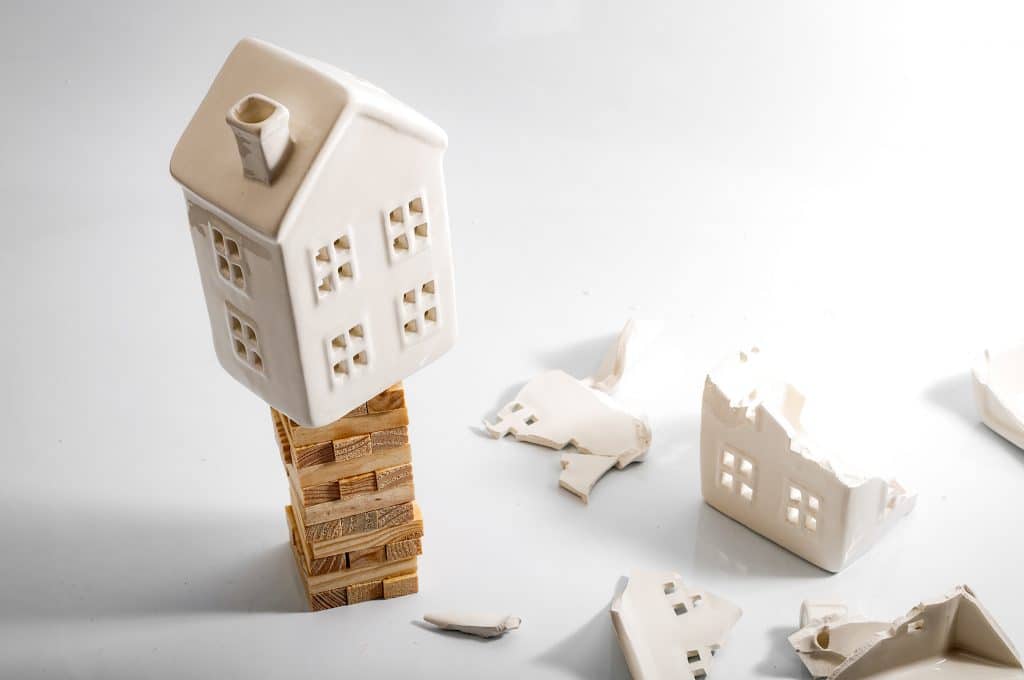Unfortunately, when significant soil movement happens under a house, the result can be foundation problems.
Some foundation issues are not severe and may only present a cosmetic problem. In contrast, other problems can be serious enough to have a costly impact on the function of plumbing and electrical systems, or the basic structural safety (and resulting value) of the entire house.
If you own a home or plan on buying a home, you need to learn how to spot the common signs of foundation issues and determine whether you are looking at a simple DIY repair or a red flag that needs to be further evaluated by a foundation engineer.
Signs of Ordinary Foundation Settling
Fortunately, not all settling is a sign of serious foundation issues. In fact, in many cases, settling is entirely normal and does not require foundation repair to remedy issues it may cause.
New homes are built square, but over time, normal curing of the construction lumber and settling of the foundation can show up in a door which no longer fits perfectly, or a window that no longer operates smoothly.
The frames around doors and windows are more rigid than the adjacent walls, so this is where stress on a structure often shows up first. A door that is hard to open or will not latch could indicate that the frame has slightly moved out of square. The same goes for a window that is stuck or will no longer close. Above or near windows and doors, cracks in the wall plaster or floor tiles may also indicate stress caused by settling of the foundation.
These common new foundation issues do not necessarily indicate a serious problem, but they should be monitored, and they should prompt you to look for more serious signs. Whether you are the current homeowner or are planning on buying a home in the near future, small signs of foundation settling like a sticky door so that won’t close, or a crack in the sheetrock should motivate you to look deeper, for the warning signs of issues that could be more serious.
10 Ways to Check for Possible Foundation Issues
- From a corner, look along the length of each exterior wall. Does any part of the wall bulge?
- Is the brick line straight?
- Is the foundation a concrete slab or is the house on a pier and beam structure? Do you see any cracks?
- Is there a level line between the foundation and house, or can you detect any tilted portion?
- Can you see any stair-step cracks in the concrete block or brick construction of walls?
- Do the walls look perfectly vertical? Check this with a level. A tilted wall is a warning sign.
- Probe any wooden beams or posts that rest on piers. Wood structures must be solid and free of rot and termite damage.
- Does the house seem well-drained or can you detect any place where water is gathering?
- Hairline cracks in mortar may be harmless but crack larger than ¼-inch could be serious.
- Horizontal cracks or diagonal cracks over doors and windows inside may be a serious sign and should be evaluated by a foundation engineer.
Are My Foundation Issues Serious?
If any of the foregoing tests give you a warning sign…or if you are just not sure… you may need to bring in a qualified foundation engineer for a professional home inspection. A foundation engineer will tell you what is really going on with the structure, the foundation, the soil, and the current conditions. At a minimum, they will advise you on problems meriting your attention and whether you need foundation repair. From that point, they can provide remedial plans or work with a contractor on getting foundation repairs permitted and approved.
Does Homeowners’ Insurance cover foundation Repair?
Your foundation is part of your home.
Consequentially, it is usually covered from typical hazards such as fire, windstorm, explosion, vehicle or aircraft damage, and water damage from an overflow of your plumbing or HVAC systems.
However, most home insurers specifically exclude your home’s foundation from coverage for damage due to natural settling and cracking, bulging or shrinking of the soil, pressure from tree roots, and flood or earthquake (although you may have a separate flood or earthquake policy).
Insurers will also reject any claim which can be traced to faulty construction, such as a poorly designed slab or a faulty mortar mix.
Likewise, if the insurer can blame the homeowner for negligence, such as failing to repair a swimming pool leak or planting a tree too close to the house, coverage will be denied.
What Does it Cost to Repair Foundation Issues?
Adjusting a door or getting a stubborn window to close on your home may only cost a bit of time and patience. Patching a wall crack, depending on the size, can be handled with a range of DIY repair kits which start at less than $10.
A small crack (less than 1/8-inch) in your wall, slab or pier can be painted over with concrete waterproofing for about $30 per gallon. The crack should be checked occasionally to determine whether the crack is stable or getting larger.
Should you note any of the 10 warning signs of serious foundation problems, you may need to schedule an inspection by a foundation engineer. Depending on the size of your home and the complexity of your foundation issues, this will cost from $500 to $800. Should the foundation engineer find nothing serious, the resulting peace of mind is well worth that cost…and should the inspection find the risk of damage to your foundation and structure or serious foundation issues, you will have taken an important first step toward safeguarding the value of your home.
Unstable walls may require steel braces or carbon fiber straps, which range from $300-700 each, spaced 6 feet apart at the site of the problem. Shoring up a foundation may require a series of $1500 piers or bolts every 6 to 8 feet. When a completely new foundation is required, the average cost is $50,000.
Should you buy a house with foundation problems? Certainly, as long as you rely on a professional inspection and take into account any remediation plan recommended by the foundation engineer.
For more details, please visit Crosstown Engineers, or to schedule an inspection to determine if you need foundation repairs, call Crosstown today at 469-751-7694.










